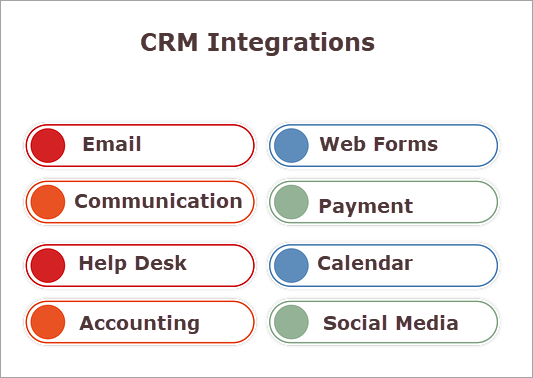Customer relationship management (CRM) is a vital tool for businesses seeking to optimize sales, service, and marketing efforts. CRM systems streamline workflows and enhance operational efficiency by consolidating customer data and communication into a centralized hub. This holistic approach empowers businesses to make data-driven decisions, foster stronger customer relationships, and ultimately drive sales growth.
What are CRM Integrations?

CRM integrations seamlessly connect your CRM software with external applications, creating a unified platform for managing customer relationships. Integrations enhance data accuracy, and boost overall efficiency by eliminating the need to juggle multiple systems.
From email marketing and processing payments to managing accounting data, these connections expand your CRM’s capabilities, ensuring data consistency and providing a unified view of your customers across different departments.
Benefits of CRM Integrations:
-
Enhanced Efficiency:
CRM integrations automate repetitive tasks, liberating your team from time-consuming manual processes. This allows your team to focus on strategic initiatives and deliver exceptional customer experiences.
-
Improved Data Accuracy:
Seamless data synchronization between systems ensures consistency and reliability, eliminating errors caused by manual data entry.
-
Better Customer Experience:
A unified platform provides a holistic view of customer interactions, enabling teams to deliver personalized and efficient service, ultimately enhancing customer satisfaction.
-
Streamlined Workflows:
Real-time access to shared data fosters collaboration and improves team communication, resulting in smoother operations and increased productivity.
-
Predictive Analytics:
By combining data from different systems, businesses can identify patterns and trends, enabling predictive modeling for future planning.
-
Improved Sales Performance:
Streamlined processes and access to customer information empower sales teams to close deals faster and increase sales.
-
Personalized Customer Interactions:
Integrating customer data from multiple sources allows for highly customized interactions, building stronger customer relationships.
-
Improved collaboration:
Integrated systems facilitate seamless information sharing across departments, fostering a sense of connection and teamwork among your teams, leading to improved collaboration.
Essential CRM Integrations for your Business:

Email Integrations:
Maintain seamless communication with leads and customers through integrated email software. Send targeted campaigns, newsletters, and personalized messages while informing clients about company updates and new offerings.
Web Form Integrations:
Integrate web forms to capture valuable customer data and leads. Collect feedback, conduct surveys, and generate qualified leads for your sales pipeline.
Communication Integrations:
Enhance customer engagement by integrating messaging platforms like Slack, WhatsApp, and Twilio into your CRM. Additionally, facilitate virtual meetings with tools such as Zoom, Google Meet, or Teams for efficient collaboration.
Accounting Integrations:
Streamline financial operations by connecting your CRM with accounting software like QuickBooks or Xero. Automate invoicing, payment processing, and payroll management for increased accuracy and efficiency.
Payment Integrations:
Simplify the payment process for customers by integrating payment gateways like Stripe, PayPal, or Bluepay into your CRM. Accept payments directly within your system and reduce manual data entry.
Help Desk Integrations:
Integrate your CRM with a help desk solution to provide exceptional customer support. This will allow you to track and resolve customer issues efficiently, improving overall customer satisfaction.
Calendar Integrations:
Optimize scheduling and time management by integrating your CRM with popular calendar platforms like Google Calendar, Outlook, or Microsoft Office 365. Sync appointments, meetings, and events for better team coordination.
Social Media Integrations:
Expand your reach and engage customers on their preferred social platforms. Integrate your CRM with platforms like Twitter, Facebook, and Instagram to monitor conversations, manage social media campaigns, and generate leads.
Tips for choosing the right CRM Integrations:
- Prioritize Your Needs: Carefully assess your business’s specific requirements before selecting integrations. Focus on tools that directly align with your goals and workflows, avoiding unnecessary integrations that can complicate your system.
- Consider Costs and Benefits: While many integrations are free, some may incur setup fees or ongoing costs. Carefully evaluate each integration’s potential return on investment to ensure it aligns with your budget and strategic objectives.
- Prioritize Data Security:
- When integrating third-party applications, prioritize data security.
- Thoroughly research the security measures implemented by the integration provider to protect your sensitive information.
- Consider factors like data encryption, access controls, and compliance with industry standards.
- Invest in Training and Support: Effective integration utilization requires proper training and support. Allocate resources for employee training and utilize available support channels to maximize the benefits of your integrations.
- Test Thoroughly: Implement a testing phase to identify and resolve potential problems before full-scale deployment.
How will OfficeClip CRM integrations boost your business efficiency?
OfficeClip integrations will provide a centralized hub for all your business data and help you seamlessly connect with different tools.
-
Email Marketing:
Reach a wider audience with targeted email campaigns, newsletters, and personalized messages using Mailjet, Sendgrid, Amazon Web Services, Sendinblue, or Socketlabs. Customize email delivery with custom SMTP integration.
-
Lead Generation and Data Capture:
Create engaging forms with Google Forms and Wufoo to collect valuable customer data, feedback, and survey responses.
-
Simplified Payments:
Accept payments seamlessly with Stripe and PayPal integrations, accelerating cash flow and reducing administrative burdens.
-
Efficient Accounting:
Streamline payroll processing by integrating OfficeClip with QuickBooks and ADP payroll system, automating invoicing and payroll processing.
-
Enhanced Communication:
Connecting with customers and team members through Twilio integration enables efficient SMS communication.
-
Synchronization:
Integrate OfficeClip with Google and Outlook to synchronize contacts, tasks, and calendars, ensuring everyone is on the same page.
-
Expanded Functionality:
Connect OfficeClip with a vast array of third-party applications through Zapier, unlocking endless possibilities for automation and integration.
Conclusion:
Remember, the journey to a fully integrated system may require some initial effort, but the long-term rewards are well worth it. Start small, analyze your business needs, and gradually expand your integrations to maximize their impact.
